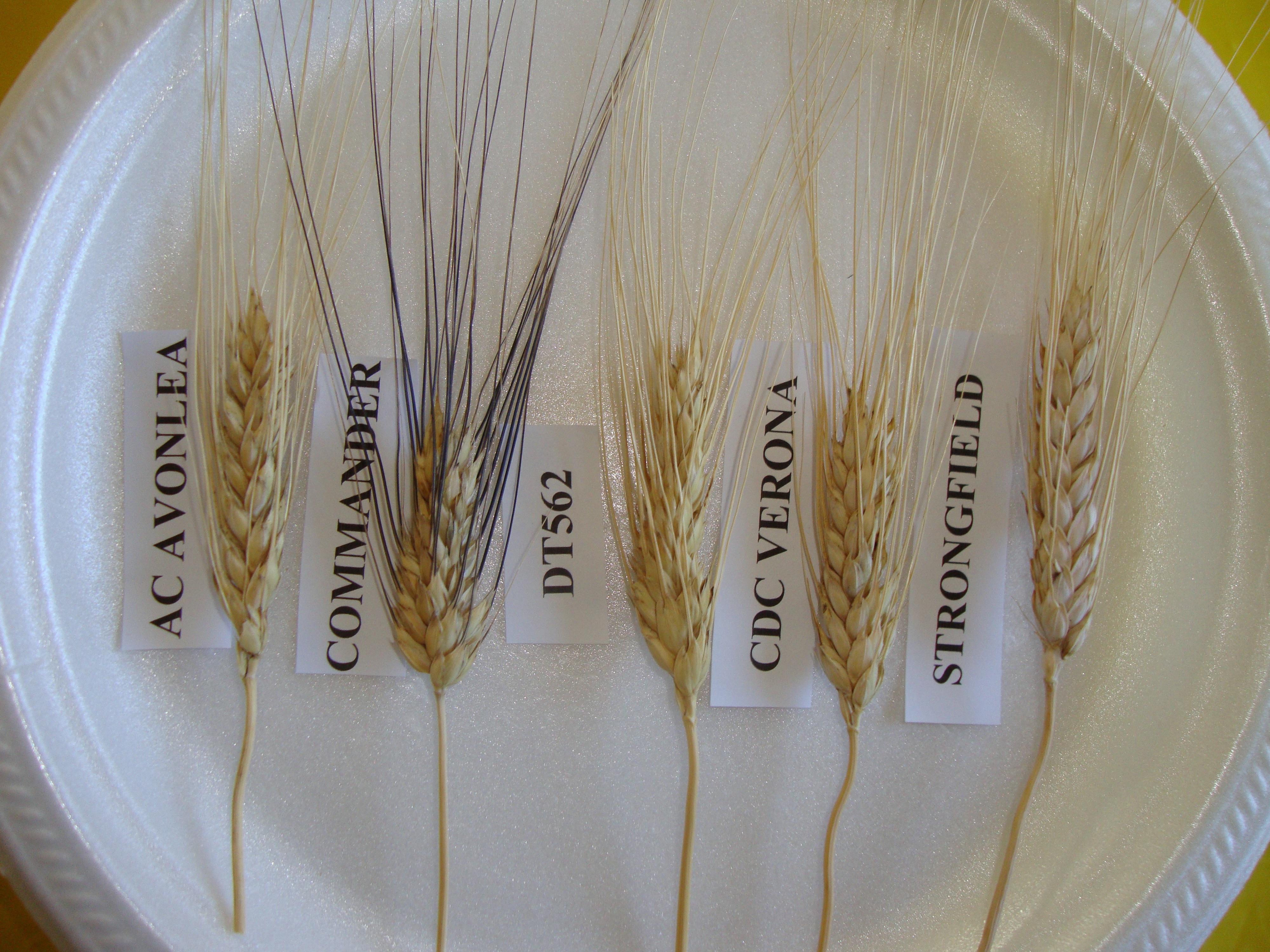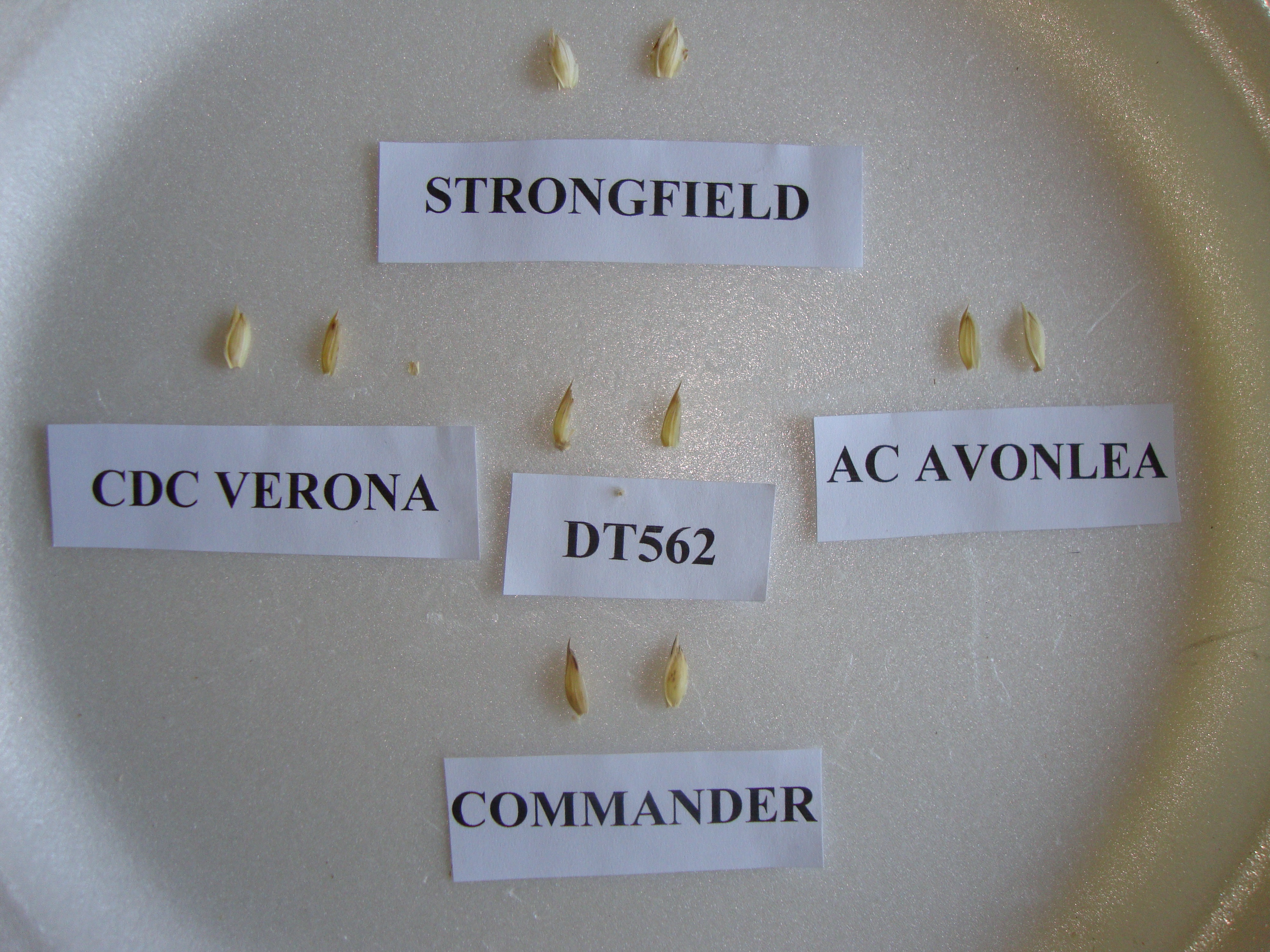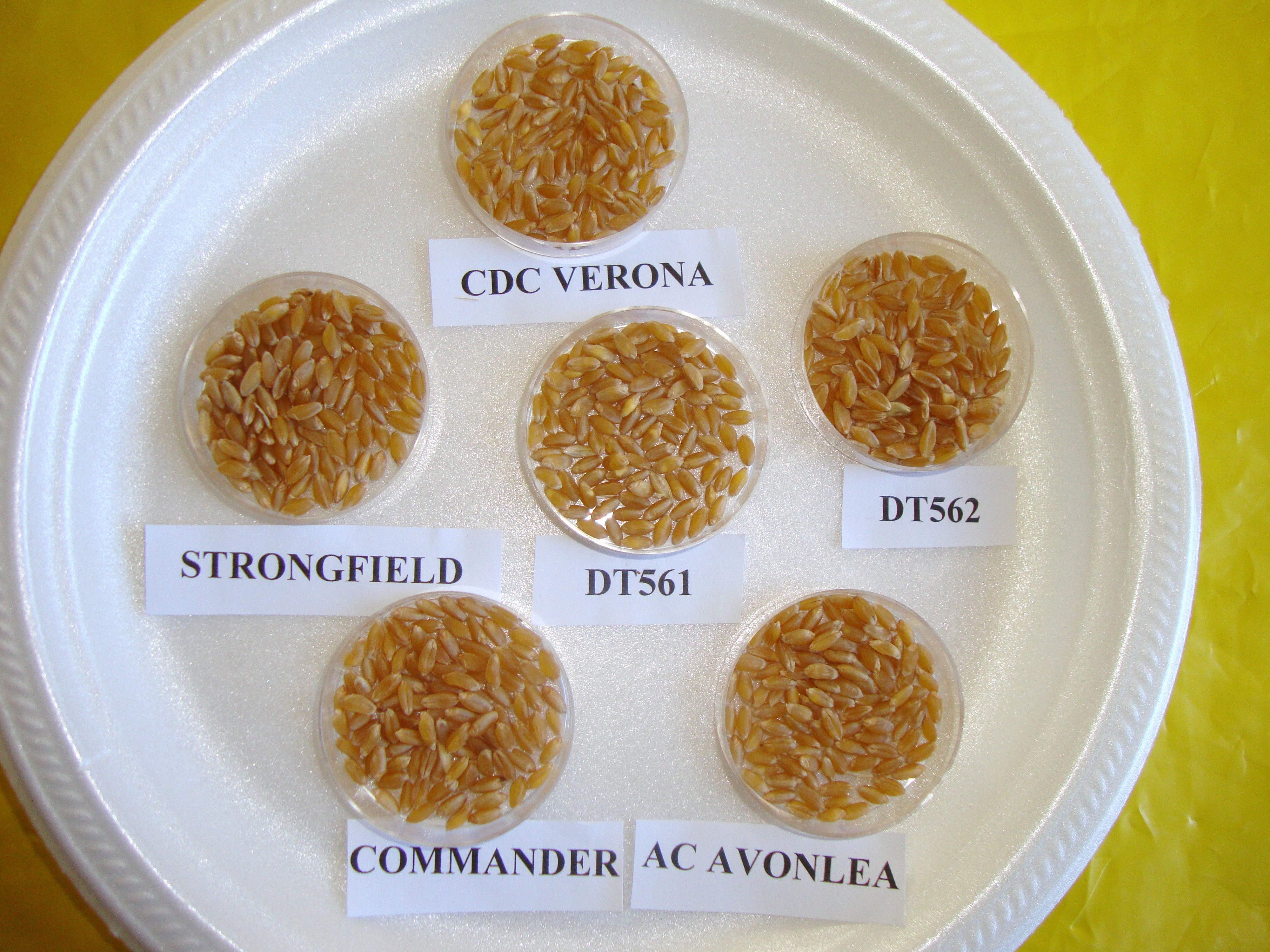CDC Vivid
| Denomination: | 'CDC Vivid' |
|---|---|
| Botanical Name: | Triticum turgidum subsp. durum |
| Applicant/Holder: |
University of Saskatchewan Crop Development Centre 4D36 Agriculture Building, 51 Campus Drive Saskatoon, Saskatchewan S7N 5A8 Canada |
| Breeder: |
Curtis Pozniak, University of Saskatchewan, Crop Development Centre, Saskatoon, Saskatchewan |
| Application Date: | 2015-05-05 |
| Provisional Protection:: | 2015-05-05 |
| Application Number: | 15-8638 |
| Grant of Rights Date: | 2018-12-06 |
| Certificate Number: | 5882 |
| Grant of Rights Termination Date: | 2038-12-06 |
Variety Description
Varieties used for comparison: 'Strongfield', 'CDC Verona', 'AC Avonlea' and 'CDC Carbide'
Summary: The coleoptile of 'CDC Vivid' has a weak to medium intensity of anthocyanin colouration while that of 'CDC Verona' has none. The flag leaf sheath of 'CDC Vivid' has a strong degree of glaucosity while that of 'CDC Verona', 'AC Avonlea' and 'CDC Carbide' have a medium degree of glaucosity. The flag leaf of 'CDC Vivid' is wider than that of 'AC Avonlea'. The plants with recurved flag leaves are of medium frequency for 'CDC Vivid' while they are absent or of very low frequency in 'Strongfield' and 'AC Avonlea' and of low frequency for 'CDC Verona' and 'CDC Carbide'. The spike of 'CDC Vivid' is longer than that of 'Strongfield'. The hairiness on the convex surface of the apical rachis segment of 'CDC Vivid' is of medium density whereas it is sparse for 'Strongfield'. The lower glume shoulder width of 'CDC Vivid' is narrow while it is of medium width for that of 'Strongfield', 'AC Avonlea' and 'CDC Carbide'.
Description:
PLANT: durum spring type, erect growth habit at the 5 to 9 tiller stage, matures mid season
SEEDLING (4 LEAF STAGE): weak to medium intensity of anthocyanin colouration of the coleoptile, glabrous sheath and blade of the lower leaves
FLAG LEAF: medium frequency of plants with recurved flag leaves, weak to medium intensity of anthocyanin colouration of the auricles, strong glaucosity of sheath, glabrous blade and sheath
CULM: medium glaucosity, weak neck curvature
STRAW (AT MATURITY): medium to thick pith in cross-section, absent or very weak intensity of anthocyanin colouration, yellow
SPIKE: strong glaucosity at heading, tapering to parallel-sided shape in profile, dense, white at maturity, erect attitude, medium density of hairiness of convex surface of apical rachis segment
AWNS: white, longer than spike, appressed to slightly spreading attitude
LOWER GLUME: medium to long, medium width, glabrous to slightly pubescent, sparse to medium extent of internal hairs
LOWER GLUME SHOULDER: narrow, strongly elevated with second point present
LOWER GLUME BEAK: medium to long, straight to slightly curved
LOWEST LEMMA: straight to slightly curved beak
KERNEL: amber, large, medium to long, medium width, elliptical shape, angular cheek shape, very short to short brush hairs, wide and deep crease
GERM: small, broad elliptical shape
AGRONOMIC CHARACTERISTICS: fair lodging resistance
PASTA QUALITY: good
DISEASE REACTIONS: resistant to Common bunt (Tilletia caries, Tilletia foetida), Leaf rust (Puccina recondita) and Stem rust (Puccinia graminis f. sp. tritici), resistant to moderately resistant to Loose smut (Ustilago tritici), susceptible to highly susceptible to Fusarium head blight (Fusarium graminearum, Fusarium species)
Origin & Breeding History: 'CDC Vivid' (experimental designation 'DT562') is the result of the cross 'DT529/9468-DQ*3' / 'Strongfield' made in the summer of 2002 at the Crop Development Centre of the University of Saskatchewan. The F1 was increased at a contra-season in New Zealand and the F2 was planted in Saskatchewan in 2003. Spikes were selected from F2 plants and advanced and the F3 seed was increased in New Zealand. In 2004, the F4 generation was planted in a leaf rust/stem rust nursery at Saskatoon and 300 plants were selected and grown as F5 head rows at Saskatoon in 2005. In 2006, selected F6 lines were grown in un-replicated yield trials in Swift Current and one line, D02.97.34 was selected for plant height, maturity and yield. In 2007, D02.97.34 was further evaluated in various locations in Saskatchewan and Alberta in the Western Durum Wheat A-test. It was evaluated as 'DT562' in the Durum Wheat co-operative tests from 2008-2011. Selection criteria were yield potential, plant maturity and plant height.
Tests & Trials: The comparative tests and trials of 'CDC Vivid' were conducted during the 2015 and 2016 growing seasons at the Crop Science Field Laboratory, University of Saskatchewan, Saskatoon, Saskatchewan. A two replicate, randomized complete block design was planted with each replicate consisting of 5 rows. The plot size was 4.5 square metres with a density of 300 plants per square metre. Measured characteristics are based on 20 measurements per variety. Mean differences are significant at the 5% probability level based on a paired Student's T-test.
Comparison tables for 'CDC Vivid' with reference varieties 'Strongfield', 'CDC Verona', 'AC Avonlea' and 'CDC Carbide'
Flag leaf width (mm)
| 'CDC Vivid' | 'Strongfield' | 'CDC Verona' | 'AC Avonlea' | 'CDC Carbide' | |
|---|---|---|---|---|---|
| mean (2015) | 12.2 | 12.4 | 12.6 | 11.2 | 11.6 |
| std. deviation (2015) | 1.0 | 1.0 | 0.8 | 0.8 | 0.9 |
| mean (2016) | 13.0 | 12.3 | 12.6 | 11.8 | 11.9 |
| std. deviation (2016) | 0.9 | 1.0 | 0.9 | 0.8 | 1.0 |
Spike length, excluding awns (cm)
| 'CDC Vivid' | 'Strongfield' | 'CDC Verona' | 'AC Avonlea' | 'CDC Carbide' | |
|---|---|---|---|---|---|
| mean (2015) | 6.5 | 6.1 | 7.2 | 6.5 | 6.8 |
| std. deviation (2015) | 0.4 | 0.6 | 0.4 | 0.4 | 0.5 |
| mean (2016) | 6.8 | 6.3 | 6.6 | 6.9 | 6.4 |
| std. deviation (2016) | 0.4 | 0.4 | 0.4 | 0.3 | 0.4 |
Click on image for larger view

Wheat: 'CDC Vivid' (centre) with reference varieties 'AC Avonlea' (far left), 'CDC Verona' (centre right) and 'Strongfield' (far right)
Click on image for larger view

Wheat: 'CDC Vivid' (centre) with reference varieties 'Strongfield' (top), 'CDC Verona' (left) and 'AC Avonlea' (right)
Click on image for larger view

Wheat: 'CDC Vivid' (right) with reference varieties 'CDC Verona' (top), 'Strongfield' (left) and 'AC Avonlea' (bottom right)
- Date modified: